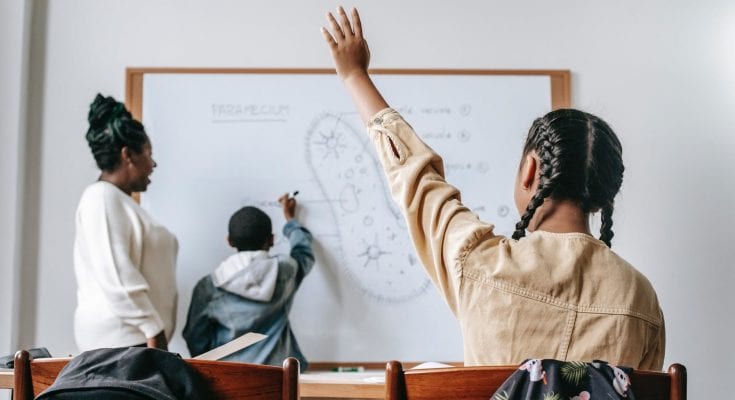Ideally, schools should be incubation centers for creativity and prepare pupils for real-life challenges. Sadly, our current schooling system is failing miserably at that. Though schools teach vital skills like writing, reading, scientific inquiry, and mathematics, they never reach beyond a pre-defined course curriculum. Moreover, modern schools pay more attention to algebraic calculations and the Renaissance movement than practical problems.
We agree that Shakespeare’s work does take your breath away with its beauty and the Pythagoras theorem stimulates your intellect. However, teachers can only teach within specific parameters that test the student’s academic ability but fail to nurture social skills or ambition. How frequently have you encountered a real-world situation where you had to find “x”?
Needless to say, the old curriculum needs to go. Our students need a curriculum that enriches their social and personal lives while improving their emotional and physical health. Down below, we mention a few subjects that modern schools should teach instead of focusing entirely on the standard curriculum.
Mindfulness And Mental health
Contrary to popular belief, the youth also has to make difficult decisions concerning their mental well-being. These decisions can be potentially harmful to their health and social life if not guided by the rights tools and knowledge.
Teaching real-life mental well-being skills early on can help foster mental hygiene practices in students. It could also enlighten them regarding emotional assessment and self-awareness. Learning mental health techniques can help youngsters navigate complex emotions, including stress, grief, and anger.
Additionally, schools should promote daily mindfulness meditation practices. These practices can provide countless emotional advantages, as well as developmental ones.
A deeper understanding of substance abuse and mental illness can remove some of the social pressures and stigma around these sensitive issues. Tragically, youth suicides have been spiking up, and the most vulnerable lack proper access to care.
However, having trained school counselors can solve this problem. Many MSW degrees online provide professionals with the necessary training to help the young ones open up about their emotions, concerns, and anxieties without apprehension.
Financial Literacy And Money Management
Imagine you just graduated high school. Boom! Suddenly, you’re responsible for all your bills and finances. Most students don’t realize the importance of having a credit card. Yet, a credit card is your gateway to maintaining a good credit score. Students would be more likely to get one if financial literacy was a part of their curriculum.
High schools also need to provide apt tax education, such as filing returns, to their students. Though dreadful, taxes are an inevitably important aspect of adult life, so including them in the high school curriculum is only logical. Moreover, it would ease many students’ worries if teachers explained the intricacies of taking out loans. Consequently, the prospect won’t be so daunting when students are in need.
We’ve all heard stories of inefficient budgeting and a lack of savings leading to sticky debt situations. When schools teach pupils ways to save money and budget their finances, they enable them to make well-informed financial decisions in the future.
Investing in your future requires a basic understanding of how interest works. Interest, simply put, is the cost of your borrowings. An early understanding of this concept would help students manage their debts, loans, and overall finances more efficiently.
Complexities Of Finding A Job
Usually, education has two goals. The first being to educate for increasing the reserve of people’s knowledge about the world around them. The second is to equip students to join the workforce and contribute positively to their economy. The second goal can only come to fruition if the individual finds a job first. Plus, employment is integral for sustaining oneself and one’s family.
If you ask most students, they will jump at the opportunity of learning any way of finding a suitable job. Hence, it would be beneficial if the school curriculum covers job applications, the interview process, employment agreements, writing cover letters, and building a solid resume.
Basic Life Skills, Mortgages, And Insurance
Including basic life and survival skills in the curriculum such as first-aid, mechanics skills, cooking, self-defense, carpentry, fire building, and plumbing should be mandatory in this age. Students need to know how to make repairs or get out of a life-threatening situation. These skills will offer students greater confidence in their ability to tackle practical problems.
Another significant and often overlooked part of adulthood is making big purchases, for example, a car or house. The majority of high schoolers are clueless about what acquiring property entails other than exchanging huge sums of money. However, plenty of things can go awry when buying a house or a car, making it imperative for students to grasp the subject before making costly decisions. Mortgages can be the most perplexing part of owning a home because of all the taxes and interests involved. Knowledge about mortgages and their payments can provide long-term benefits for the youth.
Teachers need to equip students with proper insurance terminologies and knowledge so they aren’t caught off-guard in their time of need. Sure, insurance can seem dreary, but it’s another unavoidable part of adulthood.
Government, Politics, And Citizenship Rights
Most high school classes may cover landmark constitutional bills and acts of law, but don’t explain how the same laws affect their students. Understanding your rights allows you to be a more responsible citizen. It also gives you the power to practice them when necessary.
Another excellent idea is for schools to get their students involved in politics both at the local and national levels. At the least, students shouldn’t be clueless about the current politicians and know who their state senators and the mayor are.
Sometimes, the youth doesn’t recognize or capitalize on the power of the individual vote. For that reason, teachers should brief their students about the importance and steps of the voting process.
Building And Maintaining Healthy Relationships
No matter how hard we try, we will always stumble in some of our first attempts. Dating and romantic relationships can be awkward at first, but they pay off in the end. These experiences are necessary because they enhance an individual’s growth and learning in the process. Unfortunately, schools don’t consider dating/relationships an important enough facet of our existence. In turn, they avoid teaching about relationships altogether.
Teachers need to guide and educate their students about key relationship aspects, including consent, healthy communication, personal boundaries, and toxic behavior. This knowledge can help them choose better partners, identify their likes and dislikes, and play an active role in their relationships.
To Conclude
Over the years, mainstream education has been through major upheavals. The most recent development being the COVID-19 pandemic and the switch to remote-learning as a consequence. Nevertheless, most school curriculums have remained stagnant for some decades need to be reformed to meet modern academic demands. This article discussed some practices, skills, and knowledge that schools should be imparting to their students for real-world success. These comprise mental well-being, money management, finding employment, and building relationships.
Additional Resources:
Pablo Picasso
Artificial Intelligence



